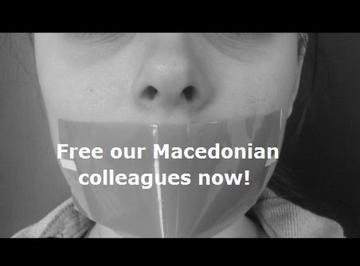
The IFJ has called for the “immediate and unconditional” release of jailed Macedonian freelance journalist Zoran Bozhinovski
Originally published by IFJ on 25th August 2016
In a letter to the country’s President and public prosecutor, IFJ General Secretary Anthony Bellanger and President Philippe Leruth condemned the arrest and continued detention of the journalist who the authorities in 2013 accused of espionage, criminal association and blackmail.
Bozhinovski – a freelance journalist and founder of the online media Burevensik.org was arrested on 21 April, after his extradition from Serbia, where he had lived for the past 3 years.
He remains in detention and has now spent more than 4 months in prison.
In its letter the IFJ states: “The arrest of a journalist for criminal activities without evidence is unacceptable in a free and democratic country and such accusations contribute to discrediting journalists as traitors and criminals and destroy the trust of the public in them".
“Mr Bozhinovski has published many factual stories about the involvement of government officials in criminal activities. We therefore believe that the only reason for arresting him is to prevent him from publishing new stories – a move which has a negative effect on media freedom in Macedonia and will restrain other journalists from carrying out investigations in to the wrongdoings of public institutions”.
The IFJ has reminded the Macedonain authorities that it is a fundamental right of journalists to investigate and write their stories - a right enshrined in European law, in Article 16 of the Constitution of the Republic of Macedonia and a central tenet of journalistic freedom.
Anthony Bellanger said: “The authorities must act now to release Zoran and take steps to ensure the fundamental rights of journalists are protected in Macedonia”.
This publication has been produced within the project European Centre for Press and Media Freedom, co-funded by the European Commission. The contents of this publication are the sole responsibility of Osservatorio Balcani e Caucaso and its partners and can in no way be taken to reflect the views of the European Union. The project's page

 Macedonia: Free Zoran Bozhinovski
Macedonia: Free Zoran Bozhinovski




 All the contents on the Osservatorio Balcani e Caucaso website are distributed with a
All the contents on the Osservatorio Balcani e Caucaso website are distributed with a  To Top
To Top